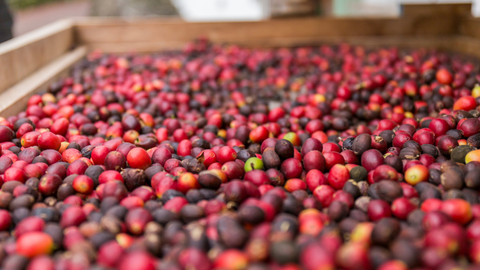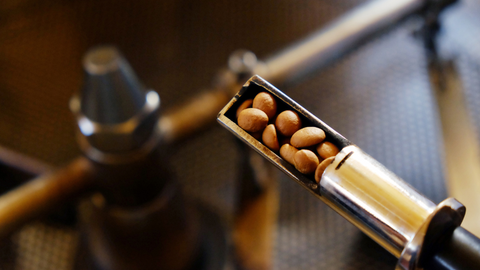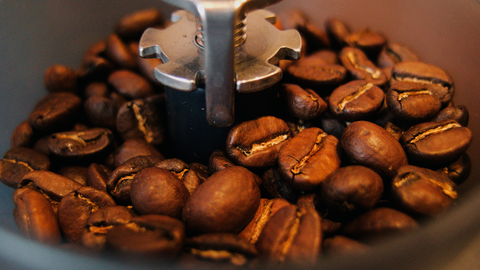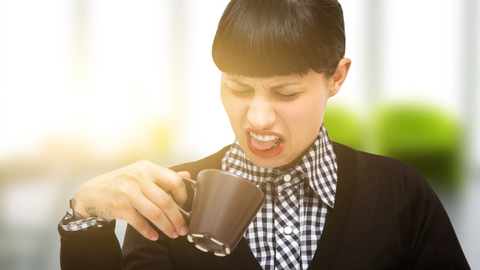Importance of Fresh Coffee Beans
You wouldn't be here reading this if you weren't already interested in Fresh coffee beans, you'd be doing what the vast majority of the population still do - and probably always will, which is buying coffee beans (or even pre-ground coffee) which is quite the opposite of Fresh!

But you're here, on a website that sells freshly roasted coffee beans, reading a post about the importance of fresh coffee beans, so like me you're probably someone who screams and runs when they see a jar of instant, and has a similar albeit slightly less dramatic reaction when accidentally walking past the bags of stale coffee beans on supermarket shelves...
OK, I'm exaggerating ever so slightly ;-). I think instant coffee is (only just) better than no coffee, and commodity coffee beans are better than instant, but I'm passionate about the fact that fresh is best, and you probably are too, again, you're here aren't you? ;-).
But in case you're not quite sure why "fresh" is important when it comes to coffee beans, or if you prefer fresh but you're not quite sure why - then this post is for you.
Fresh Usually Indicates Quality

I'm starting out here with a reason for the importance of freshness which may not be the most obvious, but I actually think is the most important reason.
When you buy freshly roasted coffee beans, they're usually higher quality coffee beans. I'm not just talking about the result of aging, I'm talking about the quality of the green beans when they were roasted.
More often than not, when you pick up a bag of coffee beans from a shelf in a supermarket, or add it to your virtual basket when doing your online shop, the green unroasted beans were not high quality coffee beans.
So regardless of the impact of having sat in the bag for who knows how long by the time you end up with them, usually these kind of coffee beans aren't the best quality coffee beans to begin with, because they're usually commodity coffee beans, and commodity coffee beans by their very definition, aren't the highest quality coffee beans.
When you buy freshly roasted coffee beans, from a specialist supplier or directly from a UK small batch coffee roaster, you're usually buying higher quality coffee beans.
What are Commodity Coffee Beans?
Commodity coffee beans are coffee beans that are traded as a commodity, priced by the NY stock exchange.
These coffee beans, are just coffee beans - just as sugar is just sugar, salt is just salt. There's no quality grading, a coffee bean is simply a coffee bean.
The vast majority of coffee sold all over the world, whether it's beans, pre-ground or instant, is this type of coffee bean - and this includes some of the biggest brand names in coffee, by the way.
Speciality coffee beans Vs Commodity coffee beans
How does Freshness Indicate Quality?

Simply put, the highest quality green unroasted coffee beans aren't traded on the commodities market, because the producers of this kind of coffee can get a more stable and often higher price for their beans than this market would provide.
The commodity price for coffee beans can be volatile, it's very difficult to run a business when you have little idea from one month to the next how much your produce is going to be worth.
Instead, the higher quality coffee beans usually make their way to small batch roasters, and into the hands of coffee lovers either directly from the roaster or via speciality coffee suppliers who work with small batch roasters.
So if you're buying freshly roasted beans from a specialist supplier or direct from the roaster, you're usually buying higher quality coffee beans.
Ageing Impairs Quality
Moving on from commodity beans vs higher quality coffee beans and the fact that you're much more likely to end up with higher quality beans when buying freshly roasted coffee beans, the most obvious benefit of fresher coffee beans is that the quality of the coffee beans have been impaired less by ageing.
Coffee beans are their highest in quality soon after roasting. Depending on the bean, there may be an initial day or two of degassing to be done, allowing the beans to go through the initial more dramatic release of CO2, and after this, they're ready to enjoy at their best. In fact, with our decaf coffee, the and the Milk Chocolate and Coconut Brazil we recommend leaving your beans to degas for around a week from the roast date.
As with any fresh produce, it gradually moves beyond its best as time goes on. So the fresher the better.
Storage Matters
How long your coffee beans deteriorate will depend on where it's stored. One of the worst places you can possibly store your coffee beans, is in the hopper of your grinder, which just happens to be where most people tend to store their coffee beans!
Coffee shops tend to empty Kilo bags of beans (or bigger volumes) into their hoppers, but they also go through them much quicker than home baristas. If you're going to be using the full bag of beans that day, then sure, slap them all in your hopper, but if a bag of coffee is more likely to last you several days or longer, you'd be better off re-thinking what you do with your coffee beans.
The best place to store coffee beans for quick access, is in airtight storage containers, such as coffee vac & airscape. Coffee stored in this way will still deteriorate, but it'll do so quite a bit slower than if you keep coffee beans in your hopper.
If you want to store coffee beans and keep them fresher for longer periods of time, the freezer isn't a bad idea, as long as you allow the beans to thaw before breaking the seal, and as long as you don't put them back in the freezer.
You will hear people saying that freezing coffee beans isn't a good idea, but the only reason it wouldn't be a good idea would be if you were freezing a bag and removing it from the freezer to take some beans out and then putting the rest of the bag back in the freezer.
This wouldn't work, the regular changes in humidity and temperature would be likely to cause issues with the beans. But as long as you follow the advice above, freezing coffee beans isn't a bad way to store them.
How to store coffee beans correctly
Espresso

One of the most common causes of many espresso extraction issues, is down to how fresh the coffee beans are.
This is why you'll find that Sage Appliances, for example, have started stating that the dual walled, pressurized baskets that they supply with their espresso machines are not just for pre-ground, but are also for use with older coffee beans.
If you want great quality espresso, near-perfect extraction and rich crema, you need to be using freshly roasted beans.
Packaging is Overrated
Don't be fooled by fancy sounding names on bags of coffee that give you the impression that regardless of the fact that the coffee beans were roasted at an unknown time in the past and have a long sell by date, that the space-age packaging process will lock in the flavours and aroma.
In my humble opinion, and from experience, packaging does little to slow down the deterioration in coffee quality.
Our packaging contains a one way valve to keep the beans fresh, one thing though is don't cut the bags! there is a strip on the back if the bag, pull the tab to open the packet, there is a plastic strip that you press to reseal the bag..simple ;-)
Freshly Ground

So far I've mainly covered the the importance of buying freshly roasted coffee beans and then being careful where storage is concerned so you can keep them as fresh as possible for as long as possible, but another very important consideration here is whole beans vs pre-ground.
As I've mentioned, you do have a bit of grace where coffee beans are concerned in terms of how long you can enjoy them at their best or close enough to being at their best, with pre-ground coffee beans though, you really have little or no grace.
This is because most of the surface area of the bean is kept safely away from the air until you grind it, but once you grind the coffee bean much, much more of it is exposed to the air.

So buying your beans whole and grinding them yourself as you're about to brew, is by far the best way to enjoy your coffee at it's best, because it goes beyond its best so much quicker once it's ground.
Initially I actually refused to sell pre-ground coffee via The Coffeeworks, simply because I want my customers to be able to enjoy the coffee they buy when it's at it's very best, and there's nothing I can do about the deterioration of pre-ground coffee during delivery.
But it became apparent that many people who wanted to try my coffee, weren't doing because they didn't have a grinder, so I thought it would make sense to supply these people with pre-ground and then do my best - with content like this - to convince customers that they would be so much better off buying a grinder and freshly grinding their own freshly roasted coffee beans, to enjoy their coffee at its very best.
Coffee grinder recommendations
So what we do now is we grind the coffee beans for our customers, for their selected brew method, but we do this literally as we're bagging it up, so that as long as Royal Mail don't let us down, it's only being resting in the bag for a day or two after grinding before it's with our customer.
This isn't ideal, you would be way, way better off buying wholebean and grinding yourself, but I think this is the next best thing.
Hopefully this has answered most of the questions you may have about coffee beans and freshness, but just in case, here's an FAQ for you:
How Do You Know Whether Coffee Beans Are Fresh?
Very simple, freshly roasted coffee beans will have a "roasted on" date on them, telling you when your beans were roasted. If it doesn't, and instead purely has a sell by date or use by date, then these are probably not freshly roasted.
By the way, if you've bought coffee from The Coffeeworks and you don't think it has a roasted on date, check the label at the bottom, on the left hand side of the bag :-).
Where to Buy Fresh Roasted Coffee Beans?
Daft question, here of course! ;-). If you're a new customer by the way, use the this code:
Use code CWNC25 for 25% off your first order.
Other places to buy freshly roasted coffee, well the most obvious source would be direct from your local small batch coffee roaster.
Many of us are very lucky these days that we have either a small batch roaster or a coffee shop which is run by a roastery where you can pick up bags of lovely freshly roasted coffee from.
Do Supermarkets Sell Freshly Roasted Coffee Beans?
Certain supermarkets sometimes stock some freshly roasted beans, which is why I use the words "mainly" and/or "usually" when I'm referring to supermarkets selling coffee beans that are traded as a commodity. Again, you'll know whether the beans you're looking at in a supermarket are freshly roasted or not because if they are, they'll have a "roasted on" date.
How to Keep Coffee Beans Fresh
Don't pour the entire bag of coffee beans into the hopper of your grinder, instead just pour the beans you're about to use (roughly) into the hopper, and leave the rest in the reseal bag, or better still transfer the beans into an airtight storage container such as Coffeevac or Airscape.
If you want to freeze your coffee beans, that's OK as long as you freeze them sealed, and let them completely thaw before you open the seal, and then don't put them back in the freezer once you've opened them.
How Long Does a Bag of Coffee Beans Stay Fresh
This really depends how you store them, but personally I think as long as you're sensible with the storage once you've opened the bag, between two to four weeks is a good rule of thumb.
Do Coffee Beans go Bad?

Dry coffee beans that haven't come into contact with moisture, don't go bad as such, in terms of going off, they simply go beyond their best, beyond their most vibrant, and get duller over time.
How Fresh Should Coffee Beans Be?
Coffee beans degas after roasting, and they continue to do so, but the most volatile stage in terms of the biggest changes occurring to the coffee bean due to the degassing (CO2 release) happens within the first 24 hours or so, for most coffee beans.
This is why you'll rarely be sold a bag of coffee beans for consumption on the day that it was roasted. It's fine to use coffee beans that have just been roasted, but they're at their most stable after this initial degassing phase, and dialling them in can be a bit tricky if you're trying to dial in a bean for espresso, when it's still in the initial degassing stage.
